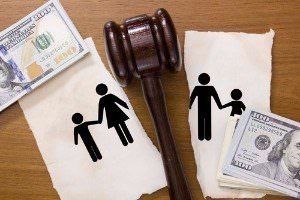Divorce Issues That Affect Children
3 Divorce Issues That Can Affect Your Children
Download Our Free Divorce Guide
 In some cases, there is little disagreement over child custody, but in many divorces this is the most contentious issue. Naturally, both parents will think themselves well-equipped to care for a child; both parents will want to spend as much time as possible with their child, provide a nurturing home for that child, and make the major decisions in that child’s life.
In some cases, there is little disagreement over child custody, but in many divorces this is the most contentious issue. Naturally, both parents will think themselves well-equipped to care for a child; both parents will want to spend as much time as possible with their child, provide a nurturing home for that child, and make the major decisions in that child’s life.
A divorce will disrupt a child’s life at every level. There will be nothing like an “ideal” child custody situation in a divorce – only compromises. Whereas all other disputes in a divorce are essentially between two people, and about what’s “fair” between them, child custody disputes – at least in the court’s eyes – aren’t about the parents at all, but about the children, the real victims in a divorce. As such, the court will not consider either parent’s best interests, or what’s “fair” between the parents. In this dispute, the only thing that matters is the child’s best interests.
Of course, you and your spouse know you child better than anyone else. In a trial, a judge will hear from three attorneys – yours, your spouse’s, and a court-appointed attorney for your child – and make a decision about your child’s best interests. This might be the best course of action if your spouse is an abuser, or otherwise not likely to cooperate in mediation. But if you and your spouse can work together in mediation, you will likely be able to come to the best arrangement for meeting your child’s needs.
1. Child Custody
 Married parents who wish to divorce must decide who should have custody of their children. If you and your spouse cannot agree on who should have custody, the court must decide for you. When awarding custody, the court always considers the best interests of the child. Factors include:
Married parents who wish to divorce must decide who should have custody of their children. If you and your spouse cannot agree on who should have custody, the court must decide for you. When awarding custody, the court always considers the best interests of the child. Factors include:
- The mental and physical health of both parents.
- Any history of domestic violence by either parent.
- The child’s preference, depending upon his or her age and maturity.
- Work schedules of each parent.
- Whether one parent has been the primary caregiver or nurturer of the child.
- The child’s relationship with siblings and members of the rest of the family.
- Each parent’s ability to encourage and foster the child’s relationship with the other parent.
In New York, there are several different types of child custody. A judge will make an informed decision based on what he or she thinks is best for the child.
Legal Custody: If one parent has legal custody, he or she is responsible for making major decisions pertaining to the child’s life, including those regarding education, religion, and health. However, courts will almost always award joint legal custody, except in cases where one parent poses a danger to the child.
Physical Custody: Physical custody means that the parent has the right to have his or her child reside with him or her. The court recognizes that it is in the best interests of a child’s development and emotional wellbeing to have a relationship with both parents. Fifty-fifty custody is not often possible, however. The proximity of one residence to a school, or one parent’s available time for taking care of a child, and even the differences in the relationship between the child and each of his or her parents, can determine who gets primary custody. So, in most cases, one parent will be the custodial parent and the other will be the non-custodial parent, or parent of alternate residence, enjoying visitation rights according to a schedule set down in the divorce agreement or court order.
Law Guardians: The court appoints a law guardian when divorcing parents cannot agree about child custody or visitation. The law guardian is also called an “attorney for the children,” and acts in exactly that capacity. This attorney will sit down with the child, examine and investigate both households, then come back to the courthouse with recommendations. If old enough to express a coherent, reasoned opinion about custody and visitation, the child’s desires will carry significant weight.
Relocating During a Divorce While Pregnant: Technically, there aren’t any restrictions that would prevent a pregnant woman from moving out of state during a divorce. Note, though, that it will be harder and more expensive for you to continue the divorce proceedings from out of state. Filing for child support will be more complicated and involve additional expenses if the father’s name isn’t on the birth certificate.
On the other hand, you have the freedom to leave the state now, but you wouldn’t have the ability to leave with your child after that child is born. Leaving after the child is born would affect the father’s visitation rights, and any move would have to be court-approved.
Tax Exemptions for Kids: According to the IRS, the residential parent gets to claim any children and take the bigger tax return. However, you may be able to negotiate this issue with your spouse, particularly if you have multiple children.
Summary:
- There aren’t any restrictions that would prevent a pregnant woman from moving out of state during a divorce.
- According to the IRS, the residential parent gets to claim any children and take the bigger tax return.
2. Visitation Rights
 Whenever possible, the court seeks a decision wherein both parents can remain involved in a child’s life. Thus, it is often possible for the non-custodial parent to gain visitation to his or her child. However, if the court determines that the non-custodial parent poses a danger to the child, or that visiting the child is not in his or her best interests, a judge may deny visitation.
Whenever possible, the court seeks a decision wherein both parents can remain involved in a child’s life. Thus, it is often possible for the non-custodial parent to gain visitation to his or her child. However, if the court determines that the non-custodial parent poses a danger to the child, or that visiting the child is not in his or her best interests, a judge may deny visitation.
Grandparents’ Visitation Rights: New York State recognizes the importance of the grandparent-grandchild relationship, but grandparents have limited rights of access to their grandchildren, especially while the parents are divorcing. The court is unlikely to grant maternal or paternal grandparents their own visitation rights, preferring them to work it out with their daughter or son, respectively.
Relocating with Sole Custody: Even if you have sole physical custody of your child, you can’t unilaterally decide to move far away from your former spouse. Regardless of your custody arrangement, your child’s parent still has visitation rights.
The first step should be to sit down with your former spouse and try to come to an agreement. You might discuss an amendment to the custody arrangement, who pays for transportation, etc.
If you can’t come to an agreement, you’ll need to appear before a court. As before, the court will consider only the child’s best interests. The fact that you have a once-in-a-lifetime career opportunity will not be enough. You must demonstrate that it will be to the child’s benefit for you to move. Your success, then, will depend on the way you package your argument for the court. That once-in-a-lifetime job opportunity could result in a substantial increase in income, which would allow you to provide more comforts and opportunities for your child. You should discuss your plans with a divorce attorney in Buffalo, who will frame your case for a judge.
Summary:
- Grandparents have limited rights of access to their grandchildren, especially while the parents are divorcing.
- Even if you have sole physical custody of your child, you can’t unilaterally decide to move far away from your former spouse.
3. Child Support
 Child support is a court-ordered payment made by the non-custodial parent to the custodial parent to help with the financial responsibility of raising a child. These payments could include:
Child support is a court-ordered payment made by the non-custodial parent to the custodial parent to help with the financial responsibility of raising a child. These payments could include:
- Cash payments determined by the parent’s income and the needs of the child.
- Health insurance for the child.
- Child care payments.
- Payments for reasonable medical expenses not covered by health insurance.
How Courts Determine Child Support: The New York State Child Support Standards Act regulates child support payments. Generally the custodial parent will be entitled to 17% of the non-custodial parent’s income (minus FICA) for one child, 25% for two children, 29% for three children, and so on.
When calculating how much child support the non-custodial parent must pay in New York, the court looks at how many children there are and the combined parental income. Other factors include:
- The age of the child or children.
- The physical and emotional health and needs of the child or children.
- The financial resources and earnings of each parent.
- The tax consequences for each party.
- Any non-monetary contributions each parent can and/or will make to the upbringing of the child or children.
- The educational needs of each parent.
- Whether one parent earns substantially more than the other.
When Child Support Ends: Child support usually ends when a child turns 21. Other events could trigger a child’s “emancipation” before that age, however, ending the child support obligation. If your child has graduated from high school and is self-supportive (lives on his or her own with a steady job, joins the military, or starts a family), this could trigger “emancipation” before the child reaches 21.
However, there can be gray areas. If a child has moved into an apartment with a boyfriend or girlfriend, the custodial parent may still be making some contributions toward the child’s welfare. You cannot simply stop paying child support; you should go to court and file to have the obligation lifted officially, to avoid arrears or other complications.
It is important to note that your child has an unconditional right to court-ordered support in the case of a divorce. This means that even if your child refuses to see you, you cannot stop paying court-ordered child support. In rare cases, an extraordinarily severe falling out may occur during the divorce proceedings. In this situation, the court may abate the child support obligation.
Child Support and Taxes: Child support is not taxable income at the federal or state level. Spousal maintenance, however, is. If parties are settling their marriage outside of a trial, they might come to a mutually beneficial agreement to lower spousal support payments and raise child support payments, avoiding taxes.
College Expenses: Especially if the children in a divorce are quite young, it’s easy to let significant expenses – like a first car, car insurance, and college – slip by.
New York State doesn’t have hard-and-fast rules about paying for a child’s college costs. A judge will make an assessment based on the particulars of your family life. If, for example, you’ve had two older children and paid for their college tuition, and a third is in high school, the judge would expect both parents to contribute to that third child’s college expenses. Judges are more likely to impose educational expenses when both parents have advanced degrees.
Generally, though, this isn’t a contentious issue. Most parents agree to share expenses and, often, limit them – for example, they’ll agree to share the costs of a state school. This is good: it keeps both parents invested in and connected with the child.
Summary:
- Child support usually ends when a child turns 21.
- Child support is not taxable income at the federal or state level.
If you or a loved one is going through a divorce and need help with matters of child custody, child support or parenting time, please contact divorce attorney in Buffalo, Randy Gugino to keep the children unaffected.






